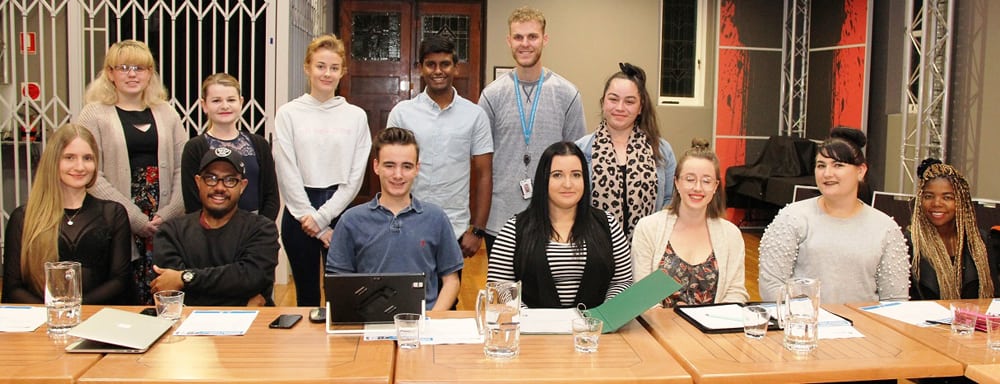The future of the city is in safe hands, going by the talent pool on the new Ipswich Youth Advisory Council.
The 20 would-be councillors, ranging in age from 16 to 25 years, meet monthly at Studio 188, Brisbane Street, to discuss matters impacting the city’s youth.
The group, which was launched in June and first came together in July, is representative of all areas of the city. Council received 46 applications, with the 20 successful persons subject to a thorough selection process.
There is cultural diversity within the youth council, including Aboriginal, Congolese, Samoan, Fijian, Maori and Australian.
There is also gender diversity (14 females, 6 males), with a mix of members undertaking secondary schooling, vocational training, apprenticeships, university studies and employment.
While some may have political aspirations, they don’t want to be recognised as a potential council-in-waiting or even discuss recent council goings-on. They have a different agenda, focussed on the biggest issues facing young people in Ipswich.
IYAC has no mayor or committee chairs. Everyone has an equal voice – they opened this week’s council meeting with all offering a quick recap of long weekend highlights (including swimming, nightclubbing, venturing into the Valley for the first time, reading, house painting, even roller skating).
Music blared from a portable bluetooth speaker, but was quieted to start proceedings, with an acknowledgement of country and run-through by their mentor, Cameron Nicholls, Children and Youth Development Officer with council’s Arts, Social Development and Community Engagement Department.
The agenda included a discussion of group rules for IYAC’s closed Facebook group; opportunities to link with other youth advisory groups; overview of the IYAC survey summary; presentation of IYAC project template; and an open mic session to raise discussion points, upcoming programs, initiatives or events, and to discuss general youth issues.
Members were then put under the Ipswich First spotlight and asked what they hoped to achieve on IYAC, how Ipswich could improve aspects of life, and how it all impacted on the city’s youth.
“People are the assets of Ipswich … but they are not having the opportunity,” said Caragh Dickson.
“A lot of small people are not playing big. We have to provide them with more of a platform to do something useful. There is just such huge potential across the city.”
Molly Mackay has lived in Ipswich her whole life. She has had the unique opportunity of working in a previous councillor’s divisional office and firmly believes breathing life into the centre of Ipswich will signal change.
“We need to do something about the CBD, sooner rather than later. It is really sad to see what has happened there,” she said.
“If we can get (Ipswich Central) going, then I think it will be a big positive for the city.”
Along the same lines, Kacie Heath felt there should be more focus on Ipswich businesses and entrepreneurs as “a lot of really cool stuff is happening here”.
“Most of the attention is on the CBD or Springfield, but people need to have a broader view of Ipswich. Some of the smaller areas in our region are forgotten but they have a lot to offer,” she said.
Alexandria Walker hoped IYAC could bring about change for young Ipswichians.
“There is not much for young people to do in the city, especially during the hours they are out and about. Places are shut up in the main street or closed early,” she said.
“We need to focus on what the youth can do. If there are things to do, places to go, young people will definitely support local businesses.”
Ms Walker said the media tended to focused on a few “bad eggs” and painted Ipswich in a negative light, but that “did not reflect the community as a whole”.
Jacinta Cabassi said it was up to IYAC to “put forward a lot of great ideas about future plans” for Ipswich.
“If we work hard enough as a team, these ideas can be implemented,” she said.
Mr Nicholls said council had committed funds for “capacitating civic leadership” through the provision of training, skills development and empowering members to undertake change-making initiatives – “youth working for youth”.
“Over the next couple of months, the Community Engagement Branch will be developing a framework which enables council departments to use IYAC as a resource to present information and receive direct input and feedback on youth-related projects, initiatives, infrastructure, etc,” he said.
IYAC member Ripley Tuuta said council “will be a massive help to us”.
“We also need community support. This is a stepping stone. We want to do our part in helping put Ipswich back on the map for positive things that happen in our city,” she said.
“Sometimes, communities do not want to get involved. We need them to back us, to back the youth of this city. We need their different perspectives.”
Emile Tootoo, who grew up in nearby Inala, said something that stands out in Ipswich is the expansive multi-cultural community and the fact that the city mostly embraces it.
“People are attracted to Ipswich because of the varied cultures. There is so much diversity in our community, but we need those people to step up and get involved even more,” he said.
“We have that local knowledge in the community. It gives everyone a boost in moral.”
However, he noted while Ipswich provided many events and occasions for the city’s youth, often free of charge, they did not always participate.
Members can participate in the IYAC program for up to two years. The next meeting will be held in the first week of November at Studio 188, Ipswich.

